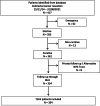Post-operative Surveillance Following Curative Resection of Colorectal Cancer in the Elderly Population in the United Kingdom: An Observational Study
- PMID: 38125234
- PMCID: PMC10730949
- DOI: 10.7759/cureus.49072
Post-operative Surveillance Following Curative Resection of Colorectal Cancer in the Elderly Population in the United Kingdom: An Observational Study
Abstract
Background Colorectal cancer most commonly affects the elderly population. Post-colorectal cancer surveillance aims to reduce cancer incidence and mortality, but its necessity and effectiveness are debated, especially in the elderly population. This study explores the relevance of computer tomography (CT) and colonoscopy surveillance in patients aged 75 and over who have undergone curative resection for colorectal cancer. Methods A retrospective analysis of prospectively collected data was conducted on patients aged 75 and over who had undergone surgical resection of colorectal cancer between November 2014 and August 2021. Data on demographics, treatment, survival, and surveillance were gathered from electronic patient records. The primary outcome was adherence to follow-up colonoscopy and CT-scan surveillance following surgery. Results A total of 417 patients underwent colorectal cancer surgery, with 334 included for analysis. The cohort had an average age of 81 years, with the majority receiving laparoscopic surgery and primary anastomosis. Twelve-month CT surveillance showed normal results in 281 patients (91.8%), while 24-month CT surveillance demonstrated normal findings in 244 patients (88.7%). Only 175 patients (52.4%) had colonoscopy follow-up, with 94 (53.7%) showing normal results, 74 (42.3%) demonstrating benign polyps, and two patients (1.1%) having histologically proven cancer. Reasons for not undergoing colonoscopy included declining invitations (30 patients, 19.1%) and being too frail (45 patients, 28.7%). Conclusion This study reinforces the notion that colonoscopy surveillance for patients over the age of 75 may have limited benefits. In an ageing population, the benefits of surveillance in terms of early detection of recurrence must be balanced against the risks of harm from the procedure, the availability of further management, cost-effectiveness, and patient preferences. An individualised approach should be adopted, potentially with colonoscopy surveillance only recommended in patients of higher risk (extramural venous invasion (EMVI)) and a low frailty score with a life expectancy over 10 years.
Keywords: colorectal cancer; current guidelines; frail elderly; surveillance colonoscopy; colonoscopy.
Copyright © 2023, Shekleton et al.
Conflict of interest statement
The authors have declared that no competing interests exist.
Figures
References
-
- Bowel cancer statistics. [ Sep; 2023 ]. 2023. https://www.cancerresearchuk.org/health-professional/cancer-statistics/s... https://www.cancerresearchuk.org/health-professional/cancer-statistics/s...
-
- Colorectal cancer NICE guideline. [ Sep; 2023 ]. 2020. https://www.nice.org.uk/guidance/ng151/chapter/Recommendations#ongoing-c... https://www.nice.org.uk/guidance/ng151/chapter/Recommendations#ongoing-c...
-
- Screening for colorectal cancer: updated evidence report and systematic review for the US Preventive Services Task Force. Lin JS, Perdue LA, Henrikson NB, Bean SI, Blasi PR. JAMA. 2021;325:1978–1998. - PubMed
LinkOut - more resources
Full Text Sources

